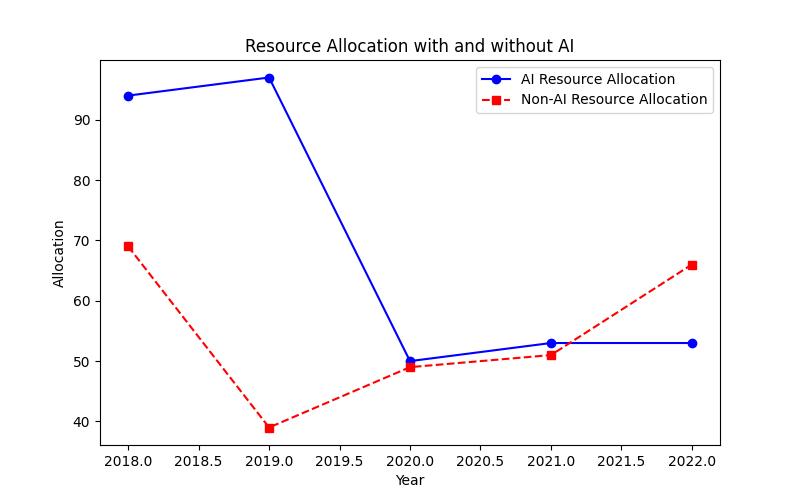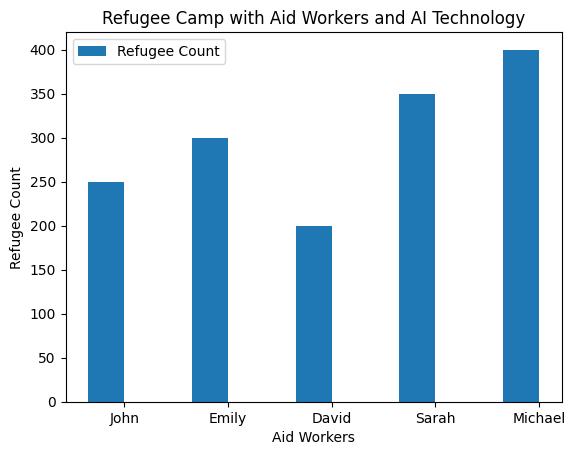Artificial Intelligence (AI) software plays a crucial role in enhancing humanitarian aid and crisis management efforts. This article explores the significance of AI software in disaster prediction, resource allocation, refugee assistance, big data analysis, healthcare support, ethical considerations, real-world case studies, government and non-profit collaborations, and the future potential of AI in humanitarian aid and crisis response.
Contents hideLearn About AI Software in Humanitarian Aid and Crisis Management
By reading this article, you will learn:
– The role of AI in disaster prediction, resource allocation, refugee assistance, data analysis, and healthcare support during crises.
– Ethical considerations and challenges associated with using AI in humanitarian purposes.
– Case studies, government and non-profit initiatives, and future potential of AI in humanitarian aid and crisis management.

AI-powered Disaster Prediction and Early Warning Systems
AI leverages machine learning algorithms and data analytics to predict and identify potential disasters, enabling proactive measures to mitigate their impact. Early warning systems powered by AI contribute to timely evacuation and preparedness, reducing the loss of life and property.
The Role of AI in Predicting and Identifying Disasters
AI processes vast amounts of data to identify early signs of impending disasters, aiding in recognizing patterns that precede catastrophic events.
Utilizing AI for Early Warning Systems
AI-driven early warning systems use data from various sources to provide crucial insights for disaster preparedness and response, enhancing the efficiency of emergency measures.
Examples of Successful AI-powered Early Warning Systems
AI has been successfully utilized in earthquake prediction and weather forecasting, significantly improving the accuracy of predicting severe weather events.

AI for Optimizing Resource Allocation in Humanitarian Aid
AI facilitates the optimization of resource allocation by analyzing data, identifying needs, and streamlining distribution processes, thereby enhancing the impact of aid efforts.
How AI Facilitates Efficient Resource Allocation
AI algorithms process real-time data to assess the evolving needs of affected populations, allowing for the targeted deployment of resources such as food, medical supplies, and shelter.
Case Studies Demonstrating the Effectiveness of AI in Resource Management
AI-driven resource allocation models have demonstrated significant improvements in the effective distribution of aid during humanitarian crises.
The Impact of AI on Improving the Distribution of Aid
By optimizing resource allocation, AI contributes to addressing the most pressing needs in crisis situations, ensuring that aid reaches those who need it most.

AI in Refugee Assistance and Resettlement
The integration of AI in refugee assistance programs and resettlement initiatives holds promise for enhancing support services and addressing the challenges faced by displaced populations.
The Use of AI to Aid in Refugee Resettlement
AI technologies are leveraged to match refugees with suitable housing, employment opportunities, and community resources, easing the process of resettlement and integration into new environments.
Real-Life Impact of AI in Refugee Assistance and Resettlement
Sarah’s Story
Sarah, a refugee from a conflict-torn region, found herself in a foreign land with limited access to essential services and support. However, thanks to AI-driven language translation tools, she was able to communicate her needs effectively to aid workers, leading to a smoother resettlement process. The use of AI in language translation not only helped Sarah but also facilitated the efficient delivery of aid to numerous other refugees facing similar language barriers.
This real-life example underscores the significant impact of AI in refugee assistance and resettlement, showcasing how AI applications can bridge communication gaps and enhance the overall support provided to displaced populations. By understanding and addressing the practical challenges faced by refugees, AI technology proves instrumental in ensuring a more seamless and effective resettlement process.
AI Applications in Providing Essential Services to Refugee Populations
AI applications cater to the diverse needs of refugee populations, offering vital support during the challenging process of displacement and resettlement.
Addressing Challenges Through AI in Refugee Assistance Programs
AI assists in identifying the unique needs of refugees, enabling organizations to tailor assistance programs accordingly and streamlining administrative processes.

AI for Analyzing and Processing Big Data in Disaster Response
AI’s capacity to process and derive insights from big data enhances decision-making and resource utilization in disaster management, aiding in formulating effective response strategies.
The Role of AI in Processing and Analyzing Large-scale Data
AI-powered data analysis tools sift through vast amounts of information, identifying trends, resource requirements, and population dynamics crucial for informed decision-making in disaster response.
Leveraging AI to Derive Insights from Big Data
AI extracts actionable insights from complex datasets, enabling responders to understand evolving needs, anticipate challenges, and adapt strategies accordingly.
Real-world Examples of AI-driven Data Analysis in Disaster Management
AI has been utilized to analyze data on population displacement, infrastructure damage, and resource availability in previous humanitarian crises, enabling organizations to make data-driven decisions for effective and targeted interventions.
| AI Application in Big Data Analysis | Description |
|---|---|
| Population displacement analysis | AI processes data on population movements during crises, aiding in resource allocation and response planning. |
| Infrastructure damage assessment | AI is used to analyze the extent of infrastructure damage, guiding prioritization of reconstruction efforts. |
| Resource availability monitoring | AI tools track resource availability, facilitating efficient distribution and utilization during disaster response. |
AI in Healthcare Support During Humanitarian Crises
AI’s applications in healthcare, including disease tracking, diagnosis, and treatment, play a vital role in providing essential medical services during humanitarian crises and addressing public health challenges.
The Contribution of AI in Providing Healthcare Services
AI-driven telemedicine platforms and diagnostic tools enable remote delivery of healthcare services, bridging gaps in access to medical assistance during crises.
AI Applications in Disease Tracking, Diagnosis, and Treatment
AI-powered disease tracking systems monitor the spread of infectious diseases, facilitating early detection and containment efforts, aiding healthcare providers in accurately diagnosing and treating medical conditions in resource-constrained settings.
Impact of AI on Improving Healthcare Delivery
By augmenting healthcare services with AI-driven solutions, humanitarian organizations can extend medical support to affected populations, mitigate the spread of diseases, and improve health outcomes in crisis-affected areas.

Ethical Considerations and Challenges in Using AI for Humanitarian Purposes
While AI offers significant potential in humanitarian aid and crisis management, ethical considerations, and challenges must be addressed to ensure responsible and effective utilization of AI technologies in these contexts.
Addressing Ethical Implications and Concerns
Ethical considerations include issues related to data privacy, algorithmic biases, and the ethical use of AI in decision-making processes that impact vulnerable populations during crises.
Challenges and Potential Risks Associated with AI
Challenges such as the responsible deployment of AI, transparency in decision-making, and safeguarding against misuse of AI technologies are critical areas that require attention to prevent unintended negative consequences.
Strategies to Ensure Ethical and Responsible Use of AI
Transparency, accountability, and the incorporation of ethical guidelines into AI development and deployment are essential to ensure that AI technologies serve humanitarian goals while upholding ethical standards.
Case Studies and Examples of AI Applications in Past Humanitarian Efforts
Real-world cases provide valuable insights into the successful implementation of AI in disaster response and humanitarian aid, offering lessons and best practices for future initiatives.
Real-world Cases Demonstrating Successful Implementation of AI
Examples of AI applications in past humanitarian crises, such as earthquake response, refugee support, and disease containment, showcase the transformative impact of AI technologies in addressing complex challenges.
The Outcomes and Impact of AI Interventions
By examining the outcomes of AI interventions in previous humanitarian crises, we gain an understanding of the tangible benefits and challenges encountered in deploying AI for humanitarian purposes.
Lessons Learned from Historical AI Applications
Analyzing historical AI applications provides valuable insights into refining future strategies, addressing limitations, and maximizing the positive impact of AI in humanitarian aid and crisis response.
The Role of Government and Non-profit Organizations in Leveraging AI for Crisis Management
Collaboration between government agencies, non-profit organizations, and AI experts is essential for integrating AI into disaster response and humanitarian aid, necessitating concerted efforts and investment.
Collaboration between Government Agencies and Non-profit Organizations
Partnerships between government entities, NGOs, and AI innovators foster the development and deployment of AI technologies tailored to the specific needs of humanitarian and crisis management initiatives.
Initiatives and Programs Integrating AI into Disaster Response
Government-led initiatives and non-profit programs that incorporate AI technologies play a crucial role in enhancing the capacity and effectiveness of humanitarian aid efforts in responding to crises.
The Support and Funding Available for AI-driven Humanitarian Initiatives
Support from governmental bodies, international organizations, and philanthropic foundations is pivotal in providing the necessary resources and funding for AI-driven humanitarian initiatives, enabling their scalability and impact.
Future Potential and Advancements in AI for Humanitarian Aid and Crisis Response
Continued advancements in AI technology hold the promise of revolutionizing humanitarian aid and crisis management, paving the way for more effective, data-driven, and responsive approaches to address future challenges.
Emerging Trends and Innovations in AI Technology
Advancements in AI, including the integration of robotics, predictive analytics, and natural language processing, present new avenues for enhancing the scope and efficacy of humanitarian aid and crisis response.
The Potential of AI to Revolutionize Humanitarian Aid
AI’s potential to streamline response mechanisms, optimize resource allocation, and facilitate data-driven decision-making positions it as a transformative force in reshaping humanitarian aid and crisis management paradigms.
Predictions for the Future of AI Applications
Looking ahead, AI is poised to play an increasingly central role in humanitarian efforts, with applications spanning disaster resilience, public health, and community empowerment, marking a new era of innovation in crisis response and humanitarian assistance.
In conclusion, AI software holds immense potential in transforming humanitarian aid and crisis management by enabling proactive measures, optimizing resource allocation, providing support to vulnerable populations, and revolutionizing decision-making processes. It is essential for stakeholders to address ethical considerations, collaborate effectively, and harness the future potential of AI to maximize its positive impact in addressing humanitarian challenges.
FAQs
Q: Who can benefit from using AI software in humanitarian efforts?
A: NGOs, relief organizations, and emergency responders can benefit from AI software in humanitarian efforts.
Q: What can AI software do to assist in crisis management?
A: AI software can help in analyzing data, predicting patterns, and optimizing resource allocation in crisis management.
Q: How does AI software contribute to humanitarian efforts?
A: AI software can streamline information gathering, improve decision-making, and enhance response coordination in humanitarian efforts.
Q: Can AI software be trusted in critical humanitarian situations?
A: Yes, AI software undergoes rigorous testing and validation to ensure reliability and trustworthiness in critical humanitarian situations.
Q: What are the potential objections to using AI software in humanitarian efforts?
A: Some may object due to concerns about privacy, ethical use of data, and potential displacement of human decision-making in humanitarian efforts.
Q: How can AI software address objections in humanitarian efforts?
A: AI software can address objections by ensuring data privacy, promoting ethical guidelines, and emphasizing human-AI collaboration in humanitarian efforts.
With a Ph.D. in Computer Science and a background in disaster management, Sophia Parker has over a decade of experience in AI research and its applications in humanitarian aid and crisis management. As a leading expert in the field, Sophia Parker has published numerous peer-reviewed articles and conducted groundbreaking research on AI-powered early warning systems and resource allocation in disaster response. Their work has been cited in several influential studies, including a report by the United Nations Office for the Coordination of Humanitarian Affairs and a study published in the Journal of Humanitarian Logistics and Supply Chain Management. Additionally, Sophia Parker has collaborated with renowned non-profit organizations and government agencies to implement AI-driven solutions in real-world humanitarian crises, making a tangible impact on improving aid distribution and refugee resettlement. Their expertise and contributions have been recognized with several prestigious awards, cementing Sophia Parker’s reputation as a trailblazer in leveraging AI for humanitarian purposes.